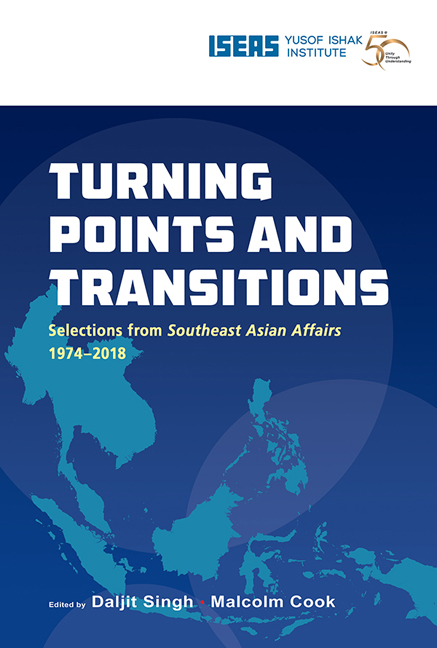Book contents
Brunei Darussalam: Challenging Stability (2016)
from BRUNEI
Published online by Cambridge University Press: 29 May 2019
Summary
For Brunei Darussalam, 2015 was primarily about the dilemma of maintaining domestic stability in the face of significant regional and global instability in areas of particular vulnerability for Southeast Asia's smallest country. Plummeting global energy prices saw the country's once extremely large current account surplus reverse into a large deficit. At the same time, as the smallest and weakest claimant in the South China Sea, Brunei has the fewest means to counter the effects of growing Chinese assertiveness, U.S.–China rivalry, and ASEAN ineffectiveness in relation to these disputed waters that lap on to the shores of the Sultanate. Aided by significant long-standing financial, political and diplomatic reserves, Brunei Darussalam was able to maintain an impressive level of social, political and diplomatic stability in these challenging times. On the economic and diplomatic fronts, Bandar Seri Begawan responded by enhancing existing relations and assets and seeking greater diversification. On the social and political fronts, the response was one of greater conservatism and centralization. As Brunei Darussalam's economic problems are significant and structural, the responses will have to pass the test of time for the country to overcome them.
More than Headwinds
Even a cursory glance at Table 1 shows how dramatically the Brunei economy was affected by falling energy prices. And yet, the growth estimates for 2015 are based on inflated price assumptions for both oil and liquefied natural gas, so the reality will likely be even worse. Likewise, current market movements suggest that the IMF price assumptions going forward err on the side of optimism.
The Sultan, His Majesty Haji Hassanal Bolkiah, is well aware that the country's hydrocarbon resources will eventually expire, possibly as early as 2025, and has tried to extend their life in recent years by capping production. The volume of oil production reportedly is now a full 40 per cent less than in 2006.1 In 2015 the scheduled and unscheduled maintenance of some of the most important energy projects has further hit production. However, the short-term costs of the policy have been exacerbated by the global collapse in the value of hydrocarbons with the price of crude oil having fallen from above US$100 in mid-2014 to less than US$30 per barrel by January 2016 and the value of natural gas per million Btu (British Thermal Unit) having fallen from over US$6 to nearly US$2 during the same period.
- Type
- Chapter
- Information
- Turning Points and TransitionsSelections from Southeast Asian Affairs 1974-2018, pp. 190 - 198Publisher: ISEAS–Yusof Ishak InstitutePrint publication year: 2018

